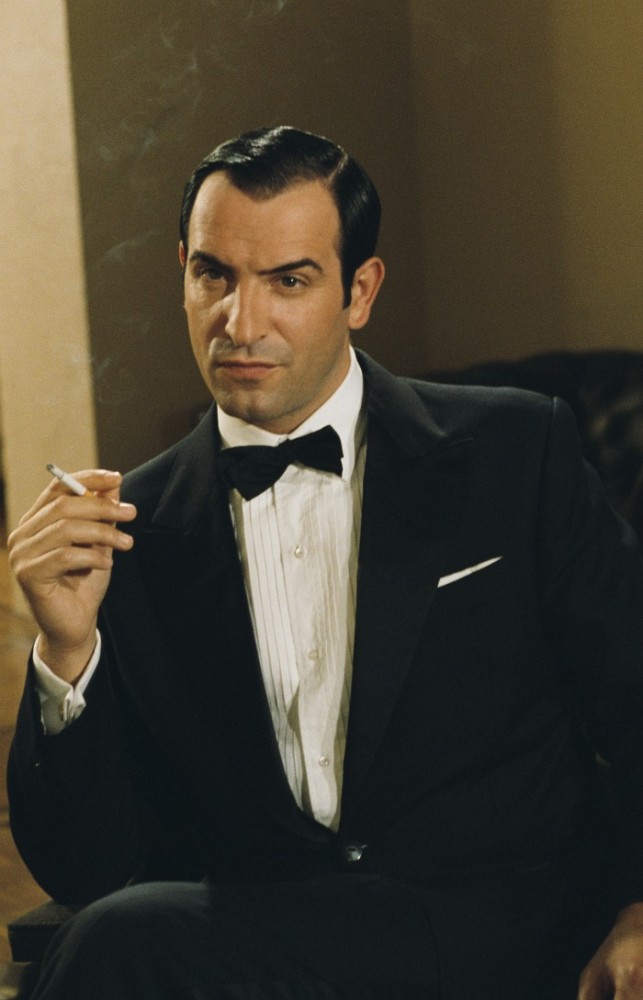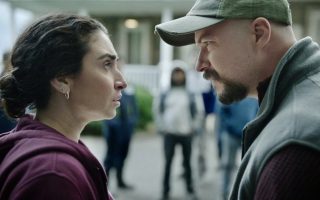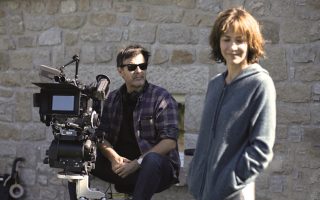Jean Dujardin

When actor Jean Dujardin accepted the role of George Valentin, a big 1920s silent-movie star whose Hollywood career is ruined by the arrival of the talkies, he knew it would be unlike any other role he’d done before. For one thing, the film itself, The Artist, was a silent movie. Second, without dialogue, he had to rely heavily on his debonair, sometimes predatory smile to build his character. The ultimate challenge was a strenuous five-month workout learning to tap dance à la Gene Kelly. And moreover it was the first time he had ever co-starred with an animal—Uggie, the loyal little fox terrier who follows him everywhere in the film.
On the up side, the actor says, he was spared the task of working on his English with a dialogue coach, since his thick French accent isn’t likely to disappear that easily. But The Artist is (give or take a few surprise effects) completely silent, shot in glorious black-and-white and jazzed up with a lively musical score.
Dujardin had already worked with director Michel Hazanavicius in his two hugely popular spy spoofs, OSS 117: Cairo, Nest of Spies and OSS 117: Lost in Rio, in which he plays the bumbling secret agent of the title. But when Hazanavicius first approached him about shooting a film with no dialogue, he says, he declined the offer at first, then quickly changed his mind.
“Everything I’ve chosen to do—from my early TV comic sketches to now—seems to have one thing in common,” he says. “C’est le plaisir. It’s taking pleasure in what I’m doing. I want to feel that I’m going to have fun. After all, that’s what I’m being asked to do—amuse people. I don’t want to make films just to make films!”
Living a fantasy
His performance in The Artist won the Palme d’Or for Best Actor at the Cannes Festival last May, and the film has since been showered with unanimous praise, scooping up awards and nominations on all fronts: New York Film Critics Circle awards for Best Picture and Best Director; Golden Globe awards for Best Picture-Comedy or Musical, Best Actor in a Comedy or Musical and Best Score; and ten Academy Award nominations, including Best Picture, Best Actor and Best Supporting Actress. But Dujardin is unwilling to speculate on how the film’s great success might propel his career even further into the international limelight.
“I’m already living my fantasy,” he says. (Modesty is his forte, it would seem from previous interviews.) “Imagine being asked to shoot a film in the US, in Los Angeles, inside the Warner Brothers studio…. It already went beyond my wildest hopes. Sure I like to dream, but I’m also pragmatic.”
How does he explain the film’s obviously universal appeal? “It’s the genre itself,” he says. “The silent era, the black-and-white, the swinging music and the love story… it all adds up to a certain nostalgia for that period. People like to remember that time. Today you have the impression that everything rushes by too quickly. Back then it seems as if there were fewer problems and more time to enjoy life. That’s the feeling I had when I visited all the 1920s monuments in LA—the downtown theaters, Mary Pickford’s house—you can imagine how much pleasure there must have been, living in that time.”
That certain smile
To prepare the role of Valentin, a vain idol with a pencil-thin mustache and smoldering eyes (think Douglas Fairbanks meets Rudolf Valentino with a bit of Errol Flynn’s panache), Dujardin says he watched countless black-and-white movie classics by early directors from F.W. Murnau (“I loved Sunrise!”) to Frank Borzage. But mostly, he adds, mugging it up for the camera came from knowing the script inside and out.
“Generally, I re-read a script about 50 times before the shoot,” he admits with a grin. “I don’t know why—maybe to reassure myself—but I think it’s a way to ask myself questions about the character. Knowing the entire script by heart helps me figure out what kind of smile I’ll want to use, or generally how to modulate the way I’m playing the character at any particular moment.”
His character in The Artist not only makes his fans swoon, but also catches the fancy of a pretty girl—and aspiring actress—in a Hollywood preview crowd, Peppy Miller (superbly played by Bérénice Bejo, in real life the wife of director Hazanavicius). But as Peppy swiftly rises from a perky extra to the toast of Hollywood, Valentin sinks into an abyss when the talkies arrive and he stubbornly tries to produce another silent film himself, descending headlong into financial ruin and the final disintegration of his unhappy marriage.
Dujardin says that one of his favorite moments in the film is when Valentin, washed up, with a film nobody wants to see, finds himself in front of a pawn shop window and steps into the reflection of a tuxedo on display—a sad vestige of his former glamour. Echoes of Charlie Chaplin? Undoubtedly. “Chaplin was a genius,” says Dujardin. “He knew how to make the bridge from silent movies to talkies. He was hugely creative.”
Surf’s up
Despite Dujardin’s currently soaring career, some French audiences still associate him primarily with the zany adolescent humor of the wildly popular Brice de Nice (2005) in which he played a caricature of the Southern California surfer with sunbleached hair, whose eternal quest for the perfect wave—off the calmly lapping shores of the Mediterranean—angles right off into the giddily ridiculous.
Similarly, in 99 Francs (2007, directed by Jan Kounen) and Lucky Luke (2009, directed by James Huth), based on a popular French comic strip about a fearless cowboy, Dujardin has enjoyed a popular success that goes hand in hand with his mile-a-minute colloquial delivery and his jokey off-screen personality. He shared screenwriting credit on Lucky Luke; worked with directors including Bertrand Blier (Le Bruit des Glaçons), Nicole Garcia (Un Balcon sur la Mer) and Guillaume Canet (Les Petits Mouchoirs, in the US Little White Lies); and is often cited for his versatility.
What triggered his desire to become an actor? “Timidity, I guess,” he says with a smile. “Like many actors, I had the desire to hide behind roles and use them to mask my own personality. And thanks to your roles, you exist a bit more—you actually become more yourself by playing other people .”
As a schoolboy, he says, his penchant for “second-degree” humor and relentless mimicking of his teachers was revealed early on. “I wasn’t turbulent in class,” the actor says,“but I was clearly better at imitating than studying.” He started honing his comedy skills while doing his military service, and continued with a band of young comics in cabarets and small theaters in Paris, which in turn led to TV talent shows and a long series of brief TV comedy sketches with Alexandra Lamy called Un Gars, Une Fille. His first big film break, Brice de Nice, was based on one of his stand-up routines.
Pure pleasure
For the moment, Dujardin plans to concentrate his career in France, and dodges the question about whether or not he’d be interested in playing a role in an English-speaking film. “I’m French and I like working with French actors,” he declares a trifle defensively. “I don’t think I interest Americans all that much… I mean, it’s not like they’re waiting for me or anything like that.”
But he’s positively ebullient when describing his next film, Les Infidèles, co-written with Gilles Lellouche, which deals with male infidelity, inspired by Dino Risi’s 1963 Les Monstres. Divided into six 15-minute shorts by six different directors (including Hazanavicius and Kounen), Dujardin describes it as “a kind of measured delirium”.
After that, he will be teaming up with actress Cécile de France to shoot Mobius, a spy drama about a powerful money launderer, directed by Eric Rochant.
But right now all the big buzz is about The Artist. Does the actor miss George Valentin? Was it difficult to remove himself from the glam charisma of the Hollywood era? “It’s never difficult to leave a part,” he says without hesitation. “All I had to do was shave my mustache and that was that! Of course, there’s always a part of him that will stay inside of me.” He pauses, for the first time in the conversation. “You know,” he says, “everyone is always asking me about all the extreme difficulties of playing such a role—when actually it’s just a question of pleasure.” Not surprisingly, the only two words the actor utters, in the final moment of The Artist, are “with pleasure”—in English, with a Maurice Chevalier-like accent. And pleasure surely sums up what Dujardin is wholeheartedly giving his audiences at the moment.
Originally published in the January 2012 issue of France Today.
Share to: Facebook Twitter LinkedIn Email
Leave a reply
Your email address will not be published. Required fields are marked *



